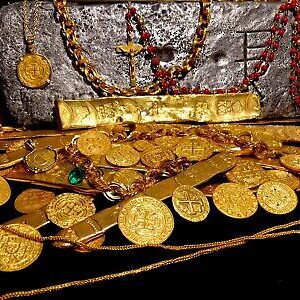Ancient Egypt, with its grand pyramids and mystical pharaohs, has long captivated the imagination. While we’ve explored the wonders and mysteries of this civilization before, today, we’re delving into the unsavory and downright repulsive aspects of their culture. Welcome to Nutty History, where we expose the filthy secrets of ancient Egypt.

**1. The Shepherd of the Rear:**
Meet Henry Reich, the first Earl of Holland and friend to King Charles I. In ancient Egypt, a similar role existed, but it was far more intricate. Enter the “Shepherd of the Royal Anus” or Niru Payhut, a qualified proctologist responsible for maintaining the hygiene of the Pharaoh’s rear. This ancient “divine intervention” involved administering enemas, reflecting their meticulous approach to rear hygiene. The role was so respected that individuals like Irianchet, a physician around 2200 BC, held esteemed positions, specializing in various areas, including the rear.
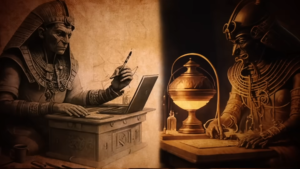
**2. Laxative Craze for Pharaohs’ Physique:**
In the pursuit of an Instagram-worthy physique, ancient Egyptian royals turned to laxatives made from castor oil. Consumed at least three times a month, these laxatives were designed to help them achieve the slim, muscular look desired. Picture a time before plumbing, where indoor toilets existed but without the luxury we know today. The laxative craze became so widespread that Egyptians treated them like aspirins, using them for various ailments and digestive issues.
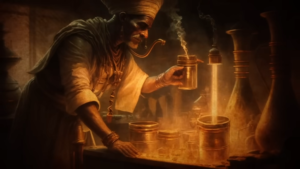
**3. The Weird Origins of Pregnancy Tests:**
Ancient Egyptians had their unique ways of detecting pregnancy. Forget modern strips; women carried pouches of barley and wheat seeds. Sprouting in one of the bags after urination signaled pregnancy. Surprisingly, this method, tested by the National Institute of Health in 1963, was found to be 70% effective. However, the Egyptians went further, associating the gender of the baby with the faster sprouting seed—barley for boys and wheat for girls. Other odd methods included a mash of beer and dates and even the use of garlic or onions for a peculiar form of breath check.
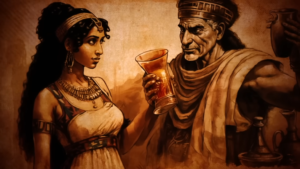
**4. The Harassment Issue:**
Despite their advancements, ancient Egypt still grappled with social issues. Women, while enjoying equal status in many aspects, faced harassment during religious festivals. Flashing, catcalling, and teasing were common practices. Even during the Ptolemaic dynasty, blame for violence and harassment against women was shifted towards them.
**5. Love Potions and Magic:**
Ancient Egyptians were fond of love magic, resorting to potions to win affection or ruin marriages out of jealousy. The recipes were bizarre, involving ingredients like dandruff, apple pips, and even semen. These concoctions were meant to make the beloved submit to the desires of the one administering the potion.
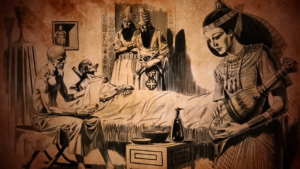
**6. Witness Battering Program:**
In an unusual twist, ancient Egyptian guards had a harsh approach to investigations. Potential witnesses or suspects were subjected to physical and psychological torment, often resulting in false confessions. Witnesses were asked to describe how they wanted to be punished, creating fear and discouraging false testimonies.
**7. The Mummification Industry:**
Preparing for the afterlife came at a cost. Mummification was an elaborate process that varied in affordability. While the wealthy could afford the full treatment, including intricate tombs and inscriptions, the poor often resorted to incomplete mummification or natural drying in desert sand. The cost of mummification, even with modern estimates, remains high.
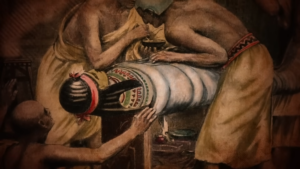
**8. King Tut’s Cursed Mummy:**
The infamous curse of King Tutankhamun is considered a hoax, but one intriguing mystery remains. King Tut was found mummified with a peculiar anatomical feature. Some historians speculate that this feature may not have belonged to him, raising questions about a potential switch during the mummification process.
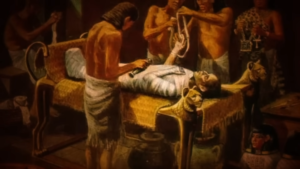
**9. Fixed Genders in Ancient Egypt:**
Contrary to modern fixed gender norms, ancient Egyptians embraced gender fluidity. They believed in posthumous gender transformation, where women with fulfilling lives would become men in the afterlife. Egyptian mythology featured gods with changing genders, challenging conventional notions of masculinity and femininity.
While we admire the achievements of ancient Egypt, it’s essential to acknowledge the peculiar and, at times, unsavory aspects of their civilization. From hygiene rituals to bizarre pregnancy tests and love potions, ancient Egypt’s history is a fascinating blend of the extraordinary and the downright bizarre. As we unravel these filthy secrets, we gain a deeper understanding of the complexities that shaped this extraordinary civilization.



